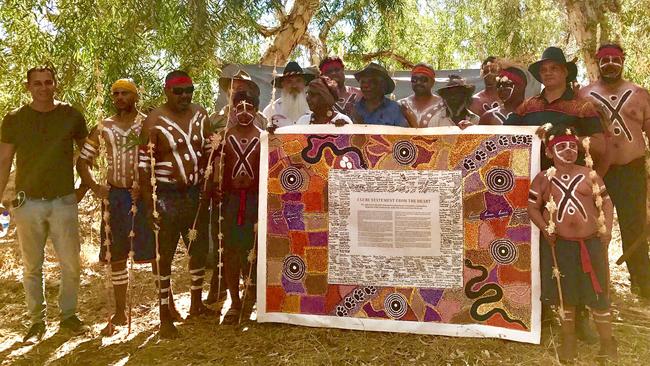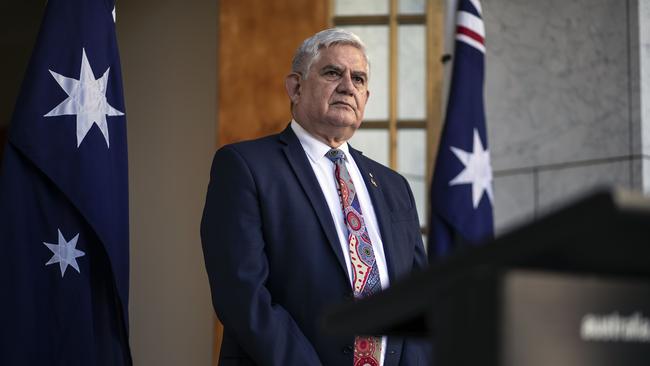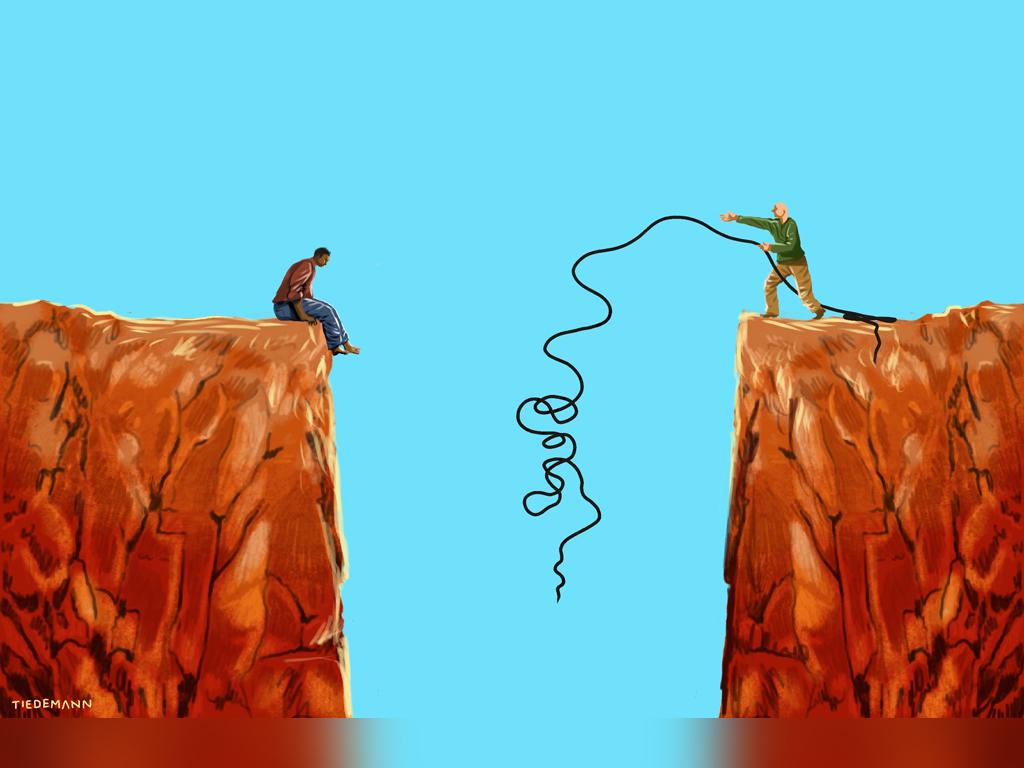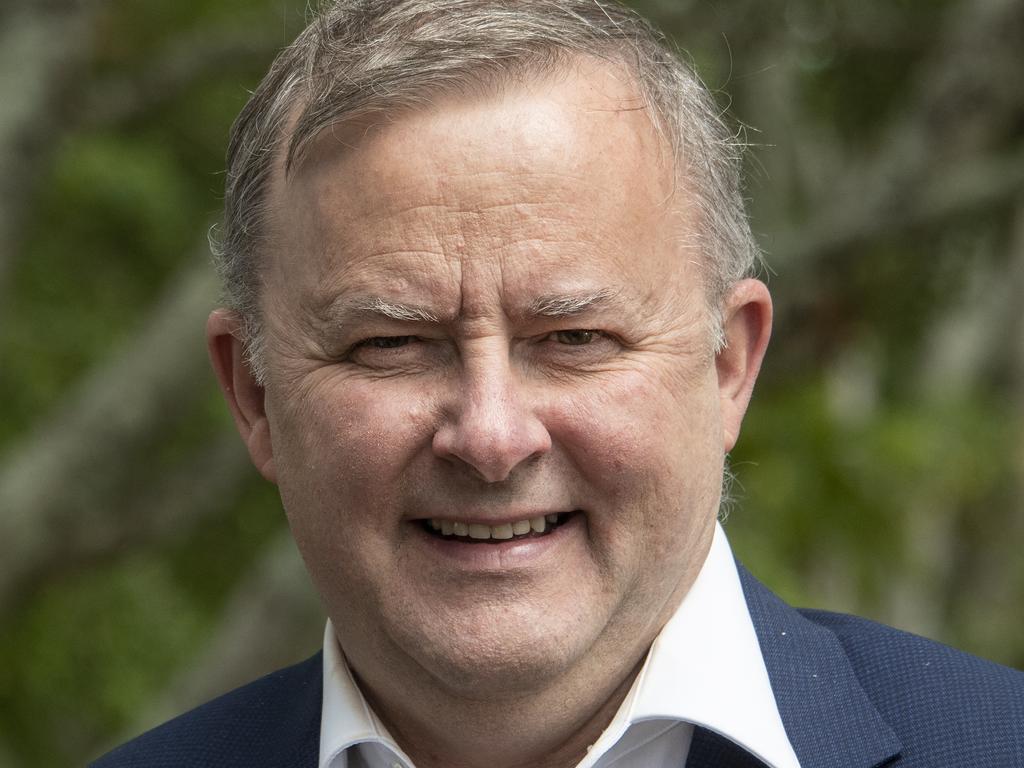An Indigenous voice: Give us a fair go, and we’ll make history together
A constitutional provision to enable a voice to parliament is critical to Indigenous parity.

The funeral procession hadn’t started yet. There was a feeling of distracted restlessness overlaid with the grief for another of our people who had left us far too early. As an Aboriginal and Torres Strait Islander person, I am familiar with the different currents of emotion that pulse through a funeral. Far too familiar. This though, felt different.
As I stood waiting for the crowd to move towards Sydney’s Redfern Oval, I could feel the textured canvas of the Uluru Statement from the Heart between my fingers. My first thought: don’t drop the cultural and political icon. My second: the bold black letters of the name of this man we were about to farewell, etched by his hand into this fabric just a few months earlier at Uluru. Just a few centimetres above my name.
Among the emotions flooding my heart, there was, and is, a cast-iron resolve that we must honour this man and the generations of Aboriginal and Torres Strait Islander people who inspired the creation of the Uluru statement by bringing it to the people of Australia. After all, it is they — you — who are invited to walk with us in a movement of the Australian people for a better future. Not the politicians or bureaucrats who drag the aspirations of Aboriginal and Torres Strait Islander people into their bubble and sterilise them of hope and imagination. We, the people, will not let them. Not this time.
Too many Australians have already accepted the invitation from the Uluru statement.
According to our research, 56 per cent of Australians would vote yes in a referendum to enable a voice to parliament in the Constitution as proposed in the Uluru statement, compared with a minority 17 per cent who oppose.

Australians know what those in the bubble refuse to acknowledge: that it is time Aboriginal and Torres Strait Islander people were given a fair go. Nowhere is this more evident than in the justice system. Aboriginal and Torres Strait Islander people are only 3 per cent of the Australian population but represent 28 per cent of the national prison population. As the Uluru statement says, we are the most incarcerated people on the planet. We are not an innately criminal people.
When the draft “refreshed” Closing the Gap targets were leaked in June, there was immediate outrage at the proposed justice target to close the incarceration rate gap between Aboriginal and Torres Strait Islander people and non-Indigenous Australians by 2093. The outrage was justified: how does a target to simply break-even 73 years into the future pass as acceptable governance in our country?
Indigenous Australians Minister Ken Wyatt rightly pushed back on the long-dated target, saying: “I don’t want to be dead and buried in the ground and this is still a target.”
When the new National Agreement on Closing the Gap was signed on July 30, the final justice target was a reduction in the rate of Aboriginal and Torres Strait Islander adults held in incarceration by at least 15 per cent by 2031.
It sounds different but did the target actually change? If the target’s current trajectory is extended beyond 2031, guess when the Aboriginal and Torres Strait Islander incarceration rate finally “reconciles” with non-Indigenous Australians? The year 2093.
Despite the minister’s plea, bureaucratic machinations ensured the only Aboriginal and Torres Strait Islander people alive today to see parity are girls not yet three years old. The old men attending the inevitable formalities to mark the milestone have not yet been born. No Australian, regardless of their political or social view, accepts that this is a fair go.
The man we farewelled at the funeral saw the formation of at least eight national bodies aimed at addressing these issues in his lifetime, none of which remain. This is why the constitutional provision to enable a voice is critical; without it, history tells us this next iteration of the voice is unlikely to see out the decade, while parliaments roll on and the bureaucracy digs in for the better part of the next century.
There is nothing symbolic or optional about the constitutional provision for the voice.
The Coalition government recognised this in its election commitment last year that “a referendum will be held once a model has been settled”. Despite consistent misreporting, this is the government’s policy commitment to the Australian people.
The government is preparing to release options for a voice model for public consultation by the end of the year with the aim to finalise a model sometime next year. On finalising the model, there must be a deliberate consideration of the constitutional and legislative options to enact the voice and a guaranteed pathway to a referendum.
Two former chief justices of Australia and several constitutionally conservative experts have already said the voice is the safest way to change the Constitution. Aboriginal and Torres Strait Islander people and the thousands of Australians outside the bubble who have accepted the Uluru statement’s invitation will not accept a voice without a commitment to a referendum.
They know it is time for a fair go and that a voice is the only proposal to change the Constitution that has a practical impact on the lives of Aboriginal and Torres Strait Islander people. It has taken us generations to come to this point of reckoning, more than 50 years after the 1967 referendum. Then, as now, the Australian people know it’s time we come together and make our own history through a referendum on a voice.
Dean Parkin is from the Quandamooka peoples of Minjerribah (North Stradbroke Island) in Queensland. He is director of From the Heart, a campaign for an Aboriginal and Torres Strait Islander voice to parliament enabled by the Constitution, as described in the Uluru Statement from the Heart.




